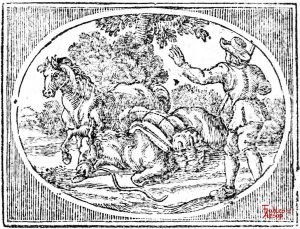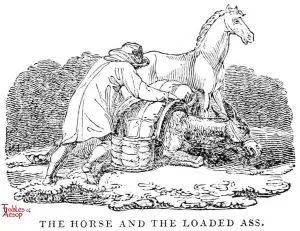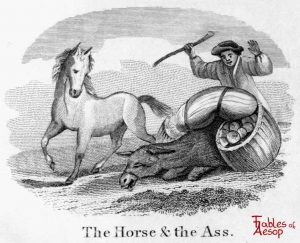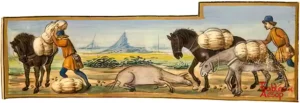An ass was overloaded and asked for help. No help was forthcoming and the ass died. The other animal then had to carry the whole load.
Help one another.
A muleteer started on a journey with both an Ass and a Mule, both loaded. The Ass became tired and asked the Mule to assist with part of his load. The Mule ignored the Ass who became more tired and eventually died. The muleteer, not being able to carry the load, loaded the entire Mule’s burden onto the Ass; who had to carry the entire burden alone.

Townsend version
A muleteer set forth on a journey, driving before him an Ass and a Mule, both well laden. The Ass, as long as he traveled along the plain, carried his load with ease, but when he began to ascend the steep path of the mountain, felt his load to be more than he could bear. He entreated his companion to relieve him of a small portion, that he might carry home the rest; but the Mule paid no attention to the request. The Ass shortly afterwards fell down dead under his burden. Not knowing what else to do in so wild a region, the Muleteer placed upon the Mule the load carried by the Ass in addition to his own, and at the top of all placed the hide of the Ass, after he had skinned him. The Mule, groaning beneath his heavy burden, said to himself: “I am treated according to my deserts. If I had only been willing to assist the Ass a little in his need, I should not now be bearing, together with his burden, himself as well.”

Samuel Croxall (The Horse and the loaded Ass)
AN idle Horse, and an Ass labouring under a heavy burden, were travelling the road together; they both belonged to a country fellow, who trudged it on foot by them, The Ass, ready to faint under his heavy load, entreated the Horse to assist him, and lighten his burden, by taking some of it upon his back. The Horse was ill-natured, and refused to do it: upon which the poor Ass tumbled down in the midst of the highway, and expired in an instant. The countryman ungirted his pack-saddle, and tried several ways to relieve him, but all to no purpose: which, when he perceived, he took the whole burden, and laid it upon the Horse, together with the skin of the dead Ass; so that the Horse, by his moroseness in refusing to do a small kindness, justly brought upon himself a great inconvenience.
THE APPLICATION
Self-love is no such ill principle, if it were but well and truly directed; for it is impossible that any man should love himself to any purpose, who withdraws his assistance from his friends or the public. Every government is to be considered as a body politic; and every man who lives in it, as a member of that body. Now, to carry on the allegory, no member can thrive better, than when they all jointly unite their endeavours to assist and improve the whole. If the hand was to refuse its assistance in procuring food for the mouth, they must both starve and perish together. And when those who are parties concerned in the same community, deny such assistance to each other, as the preservation of that community necessarily requires, their self-interestedness, in that case, is ill-directed, and will have a quite contrary effect from what they intended. How many people are so senseless as to think it hard that there should be any taxes in the nation! whereas, were there to be none indeed, those very people would be undone immediately. That little property they have would be presently plundered by foreign or domestic enemies; and then they would be glad to contribute their quota, even without an act of parliament. The charges of supporting a government are necessary things, and easily supplied by a due and well-proportioned contribution. But, in the narrower and more confined view, to be ready to assist our friends upon all occasions, is not only good, as it is an act of humanity, but highly discreet, as it strengthens our interest, and gives us an opportunity of lightening the burden of life.

Thomas Bewick (The Horse and The Over-Loaded Ass)
A clownish stupid Fellow, in travelling to market with his goods, loaded his Horse very lightly, and put a heavy burden upon his Ass, and was trudging along the road with them on foot. They had not travelled half-way to their journey’s end, when the Ass felt greatly overpowered with the weight he carried, and begged the Horse would be so good as to assist him by taking a part of it upon his back, and lighten the grievous burden, assuring him that through weakness he was quite exhausted, and was ready to faint. No! said the Horse, keep your burden to yourself, it does not concern me. Upon hearing this cruel reply, the poor Ass dropped down, and soon expired. The Master then ungirded the pack-saddle, and awkwardly tried several ways to relieve his Ass, but all to no purpose; it was too late. When he perceived how matters stood, he took the whole burden and laid it upon the Horse, together with the skin of the dead Ass, and when he felt tired with walking, he also mounted himself. The Horse is said to have often muttered as he went along, Well, this is my proper punishment, for refusing to help my fellow-servant in the depth of his distress.
APPLICATION.
He who has no compassion in his breast, is unrworthy the title of a man; and the heart that feels no anguish at the misfortunes of others, nor a desire to relieve those who groan under a load of sorrow, is destitute of the very grounds and principles of virtue. The eye that has no tear for the griefs of a friend, is also blind to its own interest; for the burden of human affairs must be borne by some or other of us, and the duty, as well as the common necessity of helping one another, ought not to be shuffled off by the unworthy expression of “it is none of my business:” for the business of society is more or less the business of every man who lives in it; and he who permits his weak brother, for want of timely assistance, to sink under a greater weight than he is able to sustain, deserves to be punished for his cruelty, by being obliged to bear the whole of his own distressing burdens himself. The Fable also hints at the sufferings which poor dumb useful animals undergo, from the injudicious management or cruel treatment of those under whose government they have the misfortune to fall. These kind of “hogs in armour” ought to know the benevolent text, that “A merciful man will be merciful to his beast.”

Jefferys Taylor (The Horse and The Ass)
A HORSE and a donkey once met on the road:
“Dear me!” said the former, “you’ve got a great load;
I’m really concern’d at your case, from my heart.”
“Why then,” thought the ass, “don’t you carry a part?”
At last, said the donkey, “Come, neighbour, I say,
Won’t you lend me a hand with my burden to-day?
I’ll carry the panniers, if you’ll take the sack;
If you’ll stop, I can hitch it just on to your back.”
“Not so,” said the horse, “for should that come to pass,
Your owner, I’m certain, would think me an ass;
And sooner I’d bear any load he could pile,
Than a name so contemptible, vulgar, and vile.”
The ass gave a look, but nothing replied;
For she fell to the earth with her burden, and died;
So the man coming up when he saw the ass fall,
Made the horse carry donkey, sack, panniers, and all.
We had best with good- will help our neighbours in trouble,
Nor be forced to comply when the labour is double.

JBR Collection (The Horse and The Laden Ass)
A full-fed, lazy Horse was travelling along in company with a heavily-laden Ass, belong ing to the same master. The Ass, whose back was nearly breaking with his load, besought the Horse, for the sake of common kindness, to take a portion of it. The Horse, in his pride and ill-nature, refused; and the poor Ass, after staggering on a little further, fell down and died. The master thereupon laid the whole of the burden upon the Horse’s back, and the skin of the Ass besides.

L’Estrange version (A Laden Asse and a Horse)
As a horse and an asse were upon the way together, the asse cryed out to his companion, to ease him, of his burden though never so little, he should fall down dead else. The horse would not; and so his fellow-servant sunk under his load. The master, upon this, had the asse flayed, and laid his whole pack, skin and all, upon the horse. Well, (says he) this judgment is befall’n me for my ill nature, in refusing to help my brother in the depth of his distress.
Moral
It is a christian, a natural, a reasonable, and a political duty, for all members of the same body to assist one another.

Crane Poetry Visual
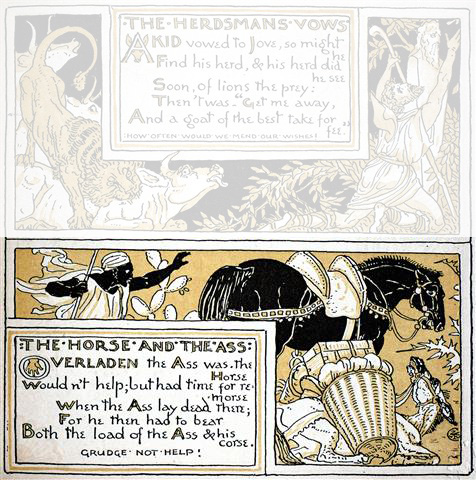
Overladen the Ass was. The Horse
Wouldn’t help; but had time for remorse
When the Ass lay dead there;
For he then had to bear
Both the load of the Ass & his corse.
Grudge not help.

Gherardo Image from 1480
Perry #263
